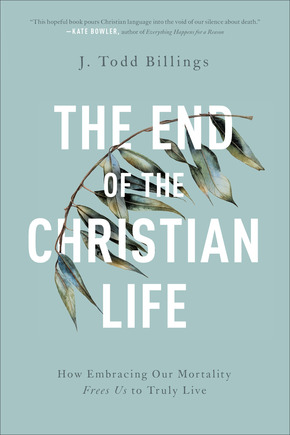J. Todd Billings: The End of the Christian Life
 J. Todd Billings, The End of the Christian Life: How Embracing Our Mortality Frees Us To Truly Live (Brazos, 2020) 239 pages, ISBN 9781587434204.
J. Todd Billings, The End of the Christian Life: How Embracing Our Mortality Frees Us To Truly Live (Brazos, 2020) 239 pages, ISBN 9781587434204.
Despite the fact that we, as mere fading mortals, go out of our way to not think about death, great works of art and literature tend to inexplicably draw us into the obscure world of mortality. The End of the Christian Life is one of the latest books to wrestle with this topic—a topic that is increasingly inconsistent with mainstream cultural mores. J. Todd Billings provides a freshness and unobscured clarity to a difficult conversation that can be attributed both to his erudite scholarship and present experience with terminal cancer. Billings increases the veracity of his book by engaging with numerous authoritative voices—from early Church Fathers to contemporary scholars. Based strictly on the title, this book concerns a critical phase in the life of a Christian, but believers and non-believers alike, who want to know how to “truly live,” will benefit greatly from the gems found at the surface and buried beneath.
Following the informative introduction, chapter one presents the reader to the pit of Sheol where those who are imprisoned within it feel abandoned, helpless, and cut off from God. Contrary to the belief of some, “no mortal lives for long without visiting Sheol for a time,” Billings muses (p. 30). Often Sheol is experienced in the death of someone close to us, frustrating our attempt for complete control over life. Our consistent denial of the recurring experience of Sheol engenders a false sense of control. Maybe we should stop fighting, “open our eyes and breathe deeply in the Pit itself,” Billings suggests (p. 45).
Billings ponders the views of his friend Walter and that of Irenaeus, a second-century bishop, both of whom approached death as part of a divine pedagogy, in the second chapter, “Two Views of Mortality.” Contrasting views, as seen through the theology of St. Augustine and the author’s experience of the memorial service for his friend Melissa, are then presented as a counterbalance. Although death may testify to God’s love for us, it is both irrational and a consequence of sin (p. 66). The reality of these opposing views is that both death and dying are, simultaneously, gifts of the “arc of human life,” and “an enigma and a wound” that point us to the redemptive death of Christ (pp. 57, 68).
Humanity is enslaved to the fear of death, but the good news is that there is a way to freedom.
Chapter five addresses two extant views of flourishing—the so-called prosperity gospel, and God’s counterview. With cancer patients as his focus, Billings talks about the religious hope that keeps them enheartened and living. He finds that deeply religious patients choose extreme measures of treatment, their risky choices revealing their view of flourishing. How Christians are formed theologically leads to important questions such as, where does our hope lie, how does God act in this world, and does God want us to prosper? Billings looks at the theology of healing as espoused by Joseph Prince and then turns to the teachings of St. Paul to examine the difference between how humans and God define prosperity. He completes this chapter by redirecting the discussion towards the Pauline emphasis of a life hidden with Christ.
Can stories about near-death experiences tell us anything about the afterlife?
The God of the Bible does offer real hope in the face of death: resurrection to new life in Christ.
Timing is everything, so it goes without saying that this book could not have been released at a better time. The global COVID-19 pandemic and its hourly coverage by an impassioned media has served to remind us of our frailty by resurrecting a once-dormant fear of mortality. Dying and death is the obvious theme of the book, but this is ameliorated by many other themes such as the human desire for control over death, and the idolatrous trust in modern medicine. I was encouraged by how the author treats these universal human perceptions with informed grace. All Christians and non-Christians will recognize themselves—their thoughts and attitudes—within the pages of this book and not feel condemned. Also, I found the discussion questions placed at the end of each chapter helpful for assimilating what was read. My only frustration was found in a minor misstep that fails to include Christians from outside of the Reformed faith tradition. Some readers may be uncomfortable with Billings’ implicit theology of God’s sovereignty, water baptism, and irresistible grace; however, any noticeable doctrinal differences do not detract from the book’s overall message. Altogether, J. Todd Billings offers to his audience a gripping message of resurrection hope in Christ, thereby lifting everyone with faith in God, up and out of the deep, dark, and ensnaring pit of Sheol.
Reviewed by Joseph R. Fiorentino
This book review previously appeared in Didaskalia: The Journal of Providence Theological Seminary, Volume 30 2021-2022, CS ISSN #0847-1266. Used with permission.
Publisher’s page: http://bakerpublishinggroup.com/books/the-end-of-the-christian-life/392000
Category: Living the Faith, Spring 2023


